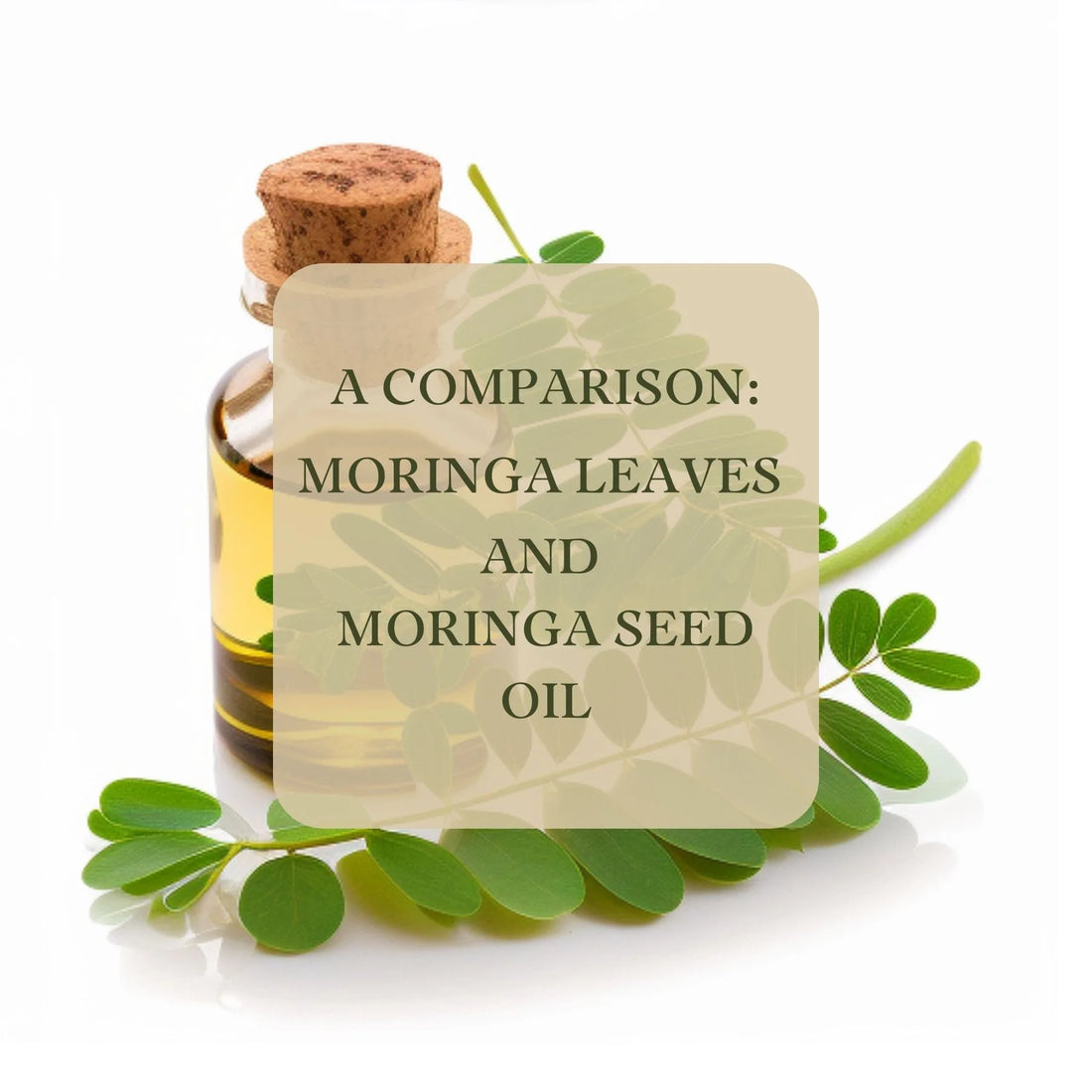Moringa Oleifera, commonly known as the "Miracle Tree," is celebrated for its nutritional and medicinal properties. Every part of the Moringa tree offers health benefits, but its leaves and seeds are particularly valued for their oil. While both Moringa leaves oil and Moringa seeds oil are derived from the same plant, they differ significantly in their composition, extraction process, benefits, and applications. This article delves into a detailed comparison between these two oils, shedding light on their unique attributes and uses.
An overview of the distinctions between Moringa leaves oil and Moringa seeds oil
| Feature | Moringa Leaves Oil | Moringa Seeds Oil |
|---|---|---|
| Extraction Method | Solvent extraction due to lower oil content in leaves. | Cold pressing, preserving nutrients, antioxidants, and fatty acids. |
| Composition | Rich in chlorophyll, vitamins, and minerals. | High in oleic acid, vitamins A and C, and antioxidants. |
| Nutritional Benefits | Boosts immunity, provides anti-inflammatory properties. | Benefits heart health, possesses anti-aging properties. |
| Cosmetic Uses | Used in creams and lotions for moisturizing and soothing skin irritations. | Popular in skincare products for moisturizing, anti-aging; used in hair treatments and perfumes. |
| Medicinal Uses | Applied topically for its antiseptic and anti-inflammatory properties. | Not as commonly used medicinally as the leaves oil, but valued for its overall health benefits when ingested. |
| Edible/Culinary Uses | Not typically used for culinary purposes. | Used in culinary applications for its pleasant taste and nutritional value, though more expensive than common cooking oils. |
| Shelf Life | Shorter shelf life due to components like chlorophyll that may oxidize. | Longer shelf life, stable and resistant to oxidation due to high oleic acid content. |
| Preservation | Best stored in cool, dark places, used within a few months. | Can be stored for several years under proper conditions without losing efficacy. |
Moringa Leaves Oil
Extraction and Composition
Extraction: Moringa leaves oil is less commonly found and is extracted using solvent extraction methods due to the lower oil content in the leaves.
Composition: Rich in chlorophyll, vitamins, and minerals, Moringa leaves oil is more akin to a macerated oil infused with the leaf's nutrients.
Nutritional Benefits
Nutrient-Rich: The oil from Moringa leaves is packed with vitamins, minerals, and antioxidants, offering a broad spectrum of health benefits, including boosting immunity and providing anti-inflammatory properties.
Cosmetic and Medicinal Uses
Skin Care: Ideal for topical applications, Moringa leaves oil is used in creams and lotions for its moisturizing and nourishing properties. It's also applied to soothe inflammation and skin irritations.
Medicinal Uses: The oil is used in traditional medicine for its antiseptic and anti-inflammatory properties.
Shelf Life and Preservation
Shelf Life: Generally has a shorter shelf life due to the presence of chlorophyll and other compounds that may oxidize over time.
Preservation: Best stored in cool, dark places and used within a few months after extraction.
Moringa Seeds Oil
Extraction and Composition
Extraction: Moringa seeds oil, also known as Ben oil, is primarily extracted through cold pressing, which helps retain most of its nutrients, antioxidants, and fatty acids.
Composition: It is high in oleic acid, making it stable and resistant to oxidation. The oil also contains vitamins A and C, and numerous antioxidants.
Nutritional Benefits
Heart Health and Anti-Aging: With its high oleic acid content, Moringa seeds oil is beneficial for heart health and possesses strong anti-aging properties due to its antioxidants.
Cosmetic and Medicinal Uses
Beauty Oil: Moringa seeds oil is highly valued in the cosmetic industry for its moisturizing, anti-aging, and protective qualities. It's a popular ingredient in skincare products, hair treatments, and perfumes.
Edible Oil: Due to its pleasant taste and high nutritional value, Moringa seeds oil is also used in culinary applications, although it's more expensive than common cooking oils.
Shelf Life and Preservation
Shelf Life: Known for its long shelf life, thanks to the high levels of antioxidants and oleic acid that prevent rancidity.
Preservation: Can be stored for several years under proper conditions without losing its efficacy.
Conclusion
Both Moringa leaves oil and Moringa seeds oil offer unique benefits and applications, making them valuable in different contexts. Moringa leaves oil is sought after for its rich nutrient profile and medicinal properties, ideal for topical applications. In contrast, Moringa seeds oil is celebrated for its cosmetic applications, heart health benefits, and culinary uses, thanks to its stability, pleasant taste, and nutritional content. Understanding the differences between these two oils can help consumers and manufacturers choose the right oil for their specific needs, harnessing the full potential of the Moringa tree.

